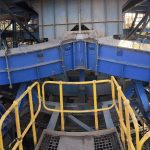TEBA, the century-old human capital solutions provider to the mining sector, has warned of a marked rise in fraudulent identity documents, passports, visas, qualifications, records of service and medical certificates being used to secure employment in South Africa’s mines.
Speaking during a recent Employee Risk Management Webinar (7 August 2025), TEBA executives highlighted that nearly 10% of ID checks conducted with the Department of Home Affairs in 2024 revealed irregularities, with around 4% involving serious fraud such as impersonation, duplicate IDs or deceased persons’ documents. The trend of candidates with dubious records migrating from Gold and Platinum mining regions to other mining regions within RSA and further afield was also highlighted.
“Screening is not administrative red tape; it is core strategic risk management,” said Willem Beeby, TEBA’s Head of Growth and Innovation. “If left unchecked, hiring of the incorrect people threaten mine safety, legal compliance, community trust, and the industry’s licence to operate.”
Fraud on the Rise Across All Levels
A recent webinar, attended by over 140 mining executives, HR and SHEQ professionals and Business Partners, revealed that fraud is not limited to one category of employee or novice. It has become sophisticated to the point where various weaknesses are being exploited including; –
· Green ID books remain valid but are highly vulnerable, with fraud rates of up to 34% reported.
· Smart ID cards are fraudulently re-issued, despite advanced security features. This means that multiple individuals hold cards which look legitimate – screening and ID will also not detect the fraud
· Visa and work permit fraud is common, with forged Temporary Residence Permits, Critical Skills and General Work Permits.
· Qualifications and blasting certificates are increasingly falsified, with syndicates targeting smaller operations with less robust HR processes.
· Medical exit certificates are being altered, allowing medically unfit workers into high-risk environments
Case studies presented included:
· An applicant presenting a forged DHA clearance letter after his ID was flagged as “blocked.”
· A senior employee producing implausible verification letters from different DHA offices within hours.
· A Malawian national submitting a forged General Work Permit later confirmed by DHA as never issued.
· Multiple fraudulent blasting certificates flagged by the Department of Mineral Resources and Energy (DMRE).
Risks for Mining Employers
Employers face significant exposure if fraudulent workers are engaged:
· Health and Safety: unqualified individuals placed in hazardous roles and long term compensation claims
· Legal: negligence claims, Section 54/55 stoppages, fines and regulatory sanctions.
· Financial: costly dismissal and reinstatement processes. Infrastructure and equipment damage.
· Reputational: community unrest linked to the perception that mines are employing illegal foreign or unfit workers over locals who are part of Social and Labour Plan Commitments.
TEBA’s Recommended Controls
To combat fraud, TEBA urged the industry to adopt stronger controls:
1. Biometric verification with external parties (fingerprint + ID + Industry Number + name match).
2. Direct verification with issuing authorities such as DHA, Border Management Authority, DMRE, MQA, and SAQA.
3. Suspicion protocols to escalate and investigate dubious documents.
4. Career progression checks to confirm qualifications align with experience through independent employment records and reference checking.
5. Industry-wide intelligence sharing to flag fraudulent trends and actors. Centralised data has already proved a useful tool in analysing trends and identifying weaknesses.
About TEBA
Founded in 1902, TEBA has been a trusted partner to the mining industry for over 120 years, providing recruitment, HR, screening, health and financial services. TEBA screens more than 280,000 mine workers and contractors annually and holds a database of 1.8 million current and former mine workers across Southern Africa.
2025-08-22















